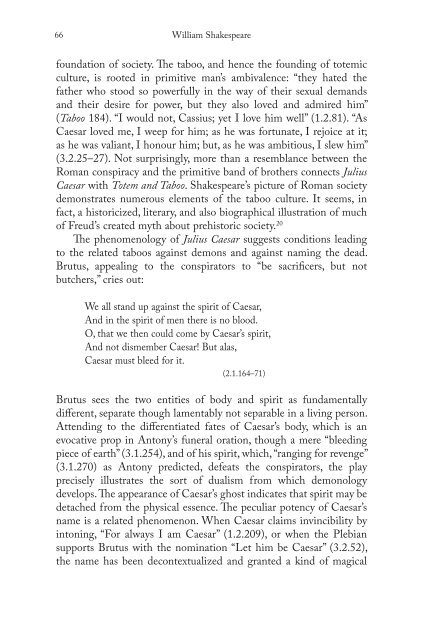Bloom's Literary Themes - ymerleksi - home
Bloom's Literary Themes - ymerleksi - home
Bloom's Literary Themes - ymerleksi - home
You also want an ePaper? Increase the reach of your titles
YUMPU automatically turns print PDFs into web optimized ePapers that Google loves.
66<br />
William Shakespeare<br />
foundation of society. The taboo, and hence the founding of totemic<br />
culture, is rooted in primitive man’s ambivalence: “they hated the<br />
father who stood so powerfully in the way of their sexual demands<br />
and their desire for power, but they also loved and admired him”<br />
(Taboo 184). “I would not, Cassius; yet I love him well” (1.2.81). “As<br />
Caesar loved me, I weep for him; as he was fortunate, I rejoice at it;<br />
as he was valiant, I honour him; but, as he was ambitious, I slew him”<br />
(3.2.25–27). Not surprisingly, more than a resemblance between the<br />
Roman conspiracy and the primitive band of brothers connects Julius<br />
Caesar with Totem and Taboo. Shakespeare’s picture of Roman society<br />
demonstrates numerous elements of the taboo culture. It seems, in<br />
fact, a historicized, literary, and also biographical illustration of much<br />
of Freud’s created myth about prehistoric society. 20<br />
The phenomenology of Julius Caesar suggests conditions leading<br />
to the related taboos against demons and against naming the dead.<br />
Brutus, appealing to the conspirators to “be sacrificers, but not<br />
butchers,” cries out:<br />
We all stand up against the spirit of Caesar,<br />
And in the spirit of men there is no blood.<br />
O, that we then could come by Caesar’s spirit,<br />
And not dismember Caesar! But alas,<br />
Caesar must bleed for it.<br />
(2.1.164–71)<br />
Brutus sees the two entities of body and spirit as fundamentally<br />
different, separate though lamentably not separable in a living person.<br />
Attending to the differentiated fates of Caesar’s body, which is an<br />
evocative prop in Antony’s funeral oration, though a mere “bleeding<br />
piece of earth” (3.1.254), and of his spirit, which, “ranging for revenge”<br />
(3.1.270) as Antony predicted, defeats the conspirators, the play<br />
precisely illustrates the sort of dualism from which demonology<br />
develops. The appearance of Caesar’s ghost indicates that spirit may be<br />
detached from the physical essence. The peculiar potency of Caesar’s<br />
name is a related phenomenon. When Caesar claims invincibility by<br />
intoning, “For always I am Caesar” (1.2.209), or when the Plebian<br />
supports Brutus with the nomination “Let him be Caesar” (3.2.52),<br />
the name has been decontextualized and granted a kind of magical
















